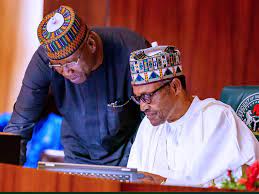By Milcah Tanimu
During a recent court session, Bamaiyi Haruna, a forensic document examiner working with the Economic and Financial Crimes Commission (EFCC), revealed that an analysis of documents used to authorize the release of $6.2 million from the Central Bank of Nigeria in February 2023 indicated forgery.
The EFCC had accused former CBN governor, Godwin Emefiele, and Odoh Ocheme (now on the run) of collaborating to obtain the funds, allegedly requested by the Secretary to the Government of the Federation (SGF) via a forged letter dated January 26, 2023. Another document titled “RE: PRESIDENTIAL DIRECTIVE ON FOREIGN ELECTION OBSERVER MISSIONS,” allegedly forged by Emefiele, was also mentioned.
Former Secretary to the Government of the Federation, Boss Mustapha, testified that the documents did not originate from former President Muhammadu Buhari or his office, further stating that the Federal Government had no involvement with foreign election observers.
Haruna, the sixth prosecution witness, testified that upon analysis, the signatures of Buhari and the ex-SGF on the documents were found to be different from their genuine signatures. He highlighted disparities in pen movement, formation, loop formation, presence of tremors, and individual characteristics between the genuine and disputed signatures.
EFCC’s counsel, Rotimi Oyedepo (SAN), requested the court to admit the forensic report and related documents as exhibits, which was granted by Justice Hamza Muazu.
During cross-examination, Emefiele’s lawyer, Mathew Burkaa (SAN), questioned how the court could determine the similarity or dissimilarity of signatures. Haruna urged the court to rely on the forensic report.
When asked if Emefiele’s signature was analyzed, Haruna responded negatively, stating that EFCC operatives submitted the materials for analysis.
The court adjourned the matter until March 11 for further proceedings.

